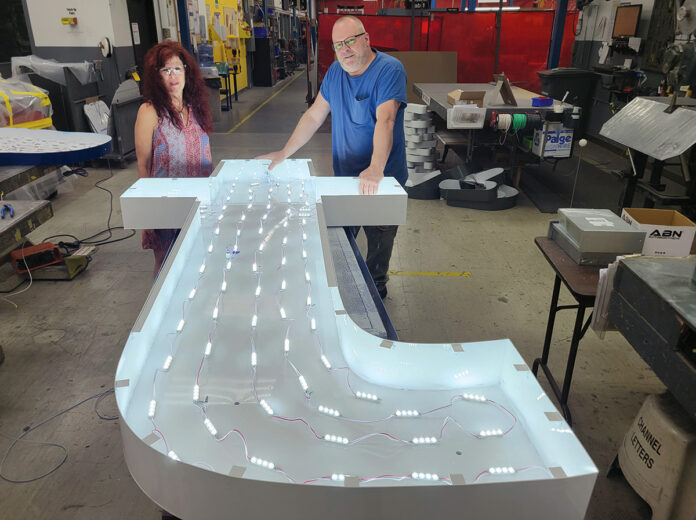
PBN Manufacturing Awards 2022
OVERALL EXCELLENCE AT A MIDSIZE MANUFACTURER:
Poyant Signs Inc.
Poyant Signs Inc., a family-owned sign-making business, was founded during the Great Depression. Many of the habits that drove business owners then – thrift, efficiency, using both sides of a sheet of paper – are very much alive today under company President Richard Poyant, grandson of the founder.
Founded in 1938 and based in New Bedford, Poyant Signs creates an array of inventive and artistic signs for dozens of businesses and institutions, from CVS Health Corp. and Dave’s Fresh Marketplace Management Inc., to schools, property developers and medical businesses.
The company employs 60 people, including Richard Poyant’s daughter, Stephanie Poyant Moran as director of sales, representing the fourth generation of the family in the company.
In the 1930s, the company’s work rested on skilled craftsmen creating signs by hand. A big bump upward in technology happened in the early 1970s, Poyant said, with the introduction of more mechanization and the use of films rather than cutting tools.
Poyant said the business values of his grandfather and father included integrity, continuous reinvestment in the business, and continuous expansion of capacity and capability.
Expansion has happened, in part, by four successive acquisitions of similar businesses between the 1990s and 2019. The first, Poyant said, was a southeastern Massachusetts sign maker and Poyant’s biggest competitor, which was owned by two brothers who wanted to retire.
That acquisition brought on board some new customers, doubled the size of the business and compelled the company to move from a 12,000-square-foot facility to a new 50,000-square-foot facility. The latest acquisition, in 2019, was of Dion Signs of Central Falls.
Expansion by acquisition is nothing new, but Poyant also is vigilant about adopting up-to-date methods, including its embrace of lean manufacturing. Poyant and a select group of managers conduct a daily 7:30 a.m. GEMBA walk that touches on every workstation in the facility. GEMBA derives from a Japanese phrase that essentially means “going to where the action is.”
Workers can bring up questions, problems or suggestions and get an answer or a promise of further investigation.
“People are more productive and not as frustrated as they might be if we were not taking these actions,” Poyant said.
Poyant Signs has worked hard to hire and develop a staff that buys into its corporate culture, said Ruben Bernardo, the company’s director of operations. One leading principle of the culture is cross-training of workers, making them able and willing to pitch in and help wherever help is needed.
Second, Bernardo said, family ownership of the business has led to a family-like way of management, in the sense that hierarchy exists but it does not intimidate. This value starts from the top, Bernardo said, and it supports the idea that everyone is approachable, and everyone is accountable.
Poyant has embraced the principles and practices of lean manufacturing, including the principle of Kaizen, meaning continuous improvement. Employees are encouraged to talk about problems in the process, and management then focuses on the process, not on the person who raised the complaint.
Poyant has concluded that being friendly to the environment is cost-effective, smart and true to the thrift values of the company’s founder. It has a rooftop solar system that produces 95% of the company’s electricity. Last year, it converted the paint system to a low volatile organic compound product. Also last year it installed new air scrubbers and upgraded vacuum systems to clean the air in the production area.
The business, which uses lots of materials of many kinds, also vigorously recycles plastics, wood, aluminum, steel, paper and cardboard. Stuff that cannot be recycled is squeezed down by a new compactor, thereby reducing use of space in the landfill.
Poyant sees uncertainty in the near future, largely because of economic realities that affect retailers such as high interest rates, a pullback in homebuying and more online shopping.
“A lot of trends are going on and any one of them could affect us,” he said. “It will be 24 months before we see where all of this is going.”












